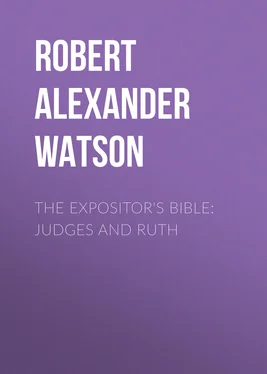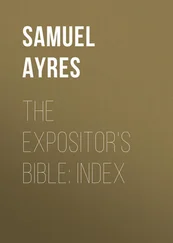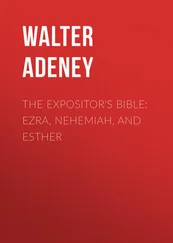Robert Alexander Watson - The Expositor's Bible - Judges and Ruth
Здесь есть возможность читать онлайн «Robert Alexander Watson - The Expositor's Bible - Judges and Ruth» — ознакомительный отрывок электронной книги совершенно бесплатно, а после прочтения отрывка купить полную версию. В некоторых случаях можно слушать аудио, скачать через торрент в формате fb2 и присутствует краткое содержание. Издательство: Иностранный паблик, Жанр: foreign_prose, foreign_religion, Философия, foreign_psychology, foreign_antique, на английском языке. Описание произведения, (предисловие) а так же отзывы посетителей доступны на портале библиотеки ЛибКат.
- Название:The Expositor's Bible: Judges and Ruth
- Автор:
- Издательство:Иностранный паблик
- Жанр:
- Год:неизвестен
- ISBN:нет данных
- Рейтинг книги:5 / 5. Голосов: 1
-
Избранное:Добавить в избранное
- Отзывы:
-
Ваша оценка:
- 100
- 1
- 2
- 3
- 4
- 5
The Expositor's Bible: Judges and Ruth: краткое содержание, описание и аннотация
Предлагаем к чтению аннотацию, описание, краткое содержание или предисловие (зависит от того, что написал сам автор книги «The Expositor's Bible: Judges and Ruth»). Если вы не нашли необходимую информацию о книге — напишите в комментариях, мы постараемся отыскать её.
The Expositor's Bible: Judges and Ruth — читать онлайн ознакомительный отрывок
Ниже представлен текст книги, разбитый по страницам. Система сохранения места последней прочитанной страницы, позволяет с удобством читать онлайн бесплатно книгу «The Expositor's Bible: Judges and Ruth», без необходимости каждый раз заново искать на чём Вы остановились. Поставьте закладку, и сможете в любой момент перейти на страницу, на которой закончили чтение.
Интервал:
Закладка:
See how life advances! God deals with the human race according to a vast plan of discipline leading to heights which at first appear inaccessible. Freedom is one of the first of these, and only by way of it are the higher summits reached. During the long ages of dark and weary struggle, which seem to many but a fruitless martyrdom, the Divine idea was interfused with all the strife. Not one blind stroke, not one agony of the craving soul was wasted. In all the wisdom of God wrought for man, through man's pathetic feebleness or most daring achievement. So out of the chaos of the gloomy valleys a highway of order was raised by which the race should mount to Freedom and thence to Faith.
We see it in the history of nations, those that have led the way and those that are following. The possessors of clear faith have won it in liberty. In Switzerland, in Scotland, in England, the order has been, first civil freedom, then Christian thought and vigour. Wallace and Bruce prepare the way for Knox; Boadicea, Hereward, the Barons of Magna Charta for Wycliffe and the Reformation; the men of the Swiss Cantons who won Morgarten and routed Charles the Bold were the forerunners of Zwingli and Farel. Israel, too, had its heroes of freedom; and even those who, like Ehud and Samson, did little or nothing for faith and struck wildly, wrongly for their country, did yet choose consciously to serve their people and were helpers of a righteousness and a holy purpose they did not know. When all has been said against them it remains true that the freedom they brought to Israel was a Divine gift.
It is to be remarked that Ehud did not judge Israel. He was a deliverer, but nowise fitted to exercise high office in the name of God. In some way not made clear in the narrative he had become the centre of the resolute spirits of Benjamin and was looked to by them to find an opportunity of striking at the oppressors. His calling, we may say, was human, not Divine; it was limited, not national; and he was not a man who could rise to any high thought of leadership. The heads of tribes, ingloriously paying tribute to the Moabites, may have scoffed at him as of no account. Yet he did what they supposed impossible. The little rising grew with the rapidity of a thunder-cloud, and, when it passed, Moab, smitten as by a lightning flash, no longer overshadowed Israel. As for the deliverer, his work having been done apparently in the course of a few days, he is seen no more in the history. While he lived, however, his name was a terror to the enemies of Israel, for what he had effected once he might be depended upon to do again if necessity arose. And the land had rest.
Here is an example of what is possible to the obscure whose qualifications are not great, but who have spirit and firmness, who are not afraid of dangers and privations on the way to an end worth gaining, be it the deliverance of their country, the freedom or purity of their church, or the rousing of society against a flagrant wrong. Do the rich and powerful angrily refuse their patronage? Do they find much to say about the impossibility of doing anything, the evil of disturbing people's minds, the duty of submission to Providence and to the advice of wise and learned persons? Those who see the time and place for acting, who hear the clarion-call of duty, will not be deterred. Armed for their task with fit weapons—the two-edged dagger of truth for the corpulent lie, the penetrating stone of a just scorn for the forehead of arrogance, they have the right to go forth, the right to succeed, though probably when the stroke has told many will be heard lamenting its untimeliness and proving the dangerous indiscretion of Ehud and all who followed him.
In the same line another type is represented by Shamgar, son of Anath, the man of the ox-goad, who considered not whether he was equipped for attacking Philistines, but turned on them from the plough, his blood leaping in him with swift indignation. The instrument of his assault was not made for the use to which it was put: the power lay in the arm that wielded the goad and the fearless will of the man who struck for his own birthright, freedom,—for Israel's birthright, to be the servant of no other race. Undoubtedly it is well that, in any efforts made for the church or for society, men should consider how they are to act and should furnish themselves in the best manner for the work that is to be done. No outfit of knowledge, skill, experience is to be despised. A man does not serve the world better in ignorance than in learning, in bluntness than in refinement. But the serious danger for such an age as our own is that strength may be frittered away and zeal expended in the mere preparation of weapons, in the mere exercise before the war begins. The important points at issue are apt to be lost sight of, and the vital distinctions on which the whole battle turns to fade away in an atmosphere of compromise. There are those who, to begin, are Israelites indeed, with a keen sense of their nationality, of the urgency of certain great thoughts and the example of heroes. Their nationality becomes less and less to them as they touch the world; the great thoughts begin to seem parochial and antiquated; the heroes are found to have been mistaken, their names cease to thrill. The man now sees nothing to fight for, he cares only to go on perfecting his equipment. Let us do him justice. It is not the toil of the conflict he shrinks from, but the rudeness of it, the dust and heat of warfare. He is no voluntary now, for he values the dignity of a State Church and feels the charm of ancient traditions. He is not a good churchman, for he will not be pledged to any creed or opposed to any school. He is rarely seen on any political platform, for he hates the watchwords of party. And this is the least of it. He is a man without a cause, a believer without a faith, a Christian without a stroke of brave work to do in the world. We love his mildness; we admire his mental possessions, his broad sympathies. But when we are throbbing with indignation he is too calm; when we catch at the ox-goad and fly at the enemy we know that he disdains our weapon and is affronted by our fire. Better, if it must be so, the rustic from the plough, the herdsman from the hill-side; better far he of the camel's hair garment and the keen cry, Repent, repent!
Israel, then, appears in these stories of her iron age as the cradle of the manhood of the modern world; in Israel the true standard was lifted up for the people. It is liberty put to a noble use that is the mark of manhood, and in Israel's history the idea of responsibility to the one living and true God takes form and clearness as that alone which fulfils and justifies liberty. Israel has a God Whose will man must do, and for the doing of it he is free. If at the outset the vigour which this thought of God infused into the Hebrew struggle for independence was tempestuous; if Jehovah was seen not in the majesty of eternal justice and sublime magnanimity, not as the Friend of all, but as the unseen King of a favoured people,—still, as freedom came, there came with it always, in some prophetic word, some Divine psalm, a more living conception of God as gracious, merciful, holy, unchangeable; and notwithstanding all lapses the Hebrew was a man of higher quality than those about him. You stand by the cradle and see no promise, nothing to attract. But give the faith which is here in infancy time to assert itself, give time for the vision of God to enlarge, and the finest type of human life will arise and establish itself, a type possible in no other way. Egypt with its long and wonderful history gives nothing to the moral life of the new world, for it produces no men. Its kings are despots, tomb-builders, its people contented or discontented slaves. Babylon and Nineveh are names that dwarf Israel's into insignificance, but their power passes and leaves only some monuments for the antiquarian, some corroborations of a Hebrew record. Egypt and Chaldea, Assyria and Persia never reached through freedom the idea of man's proper life, never rose to the sense of that sublime calling or bowed in that profound adoration of the Holy One which made the Israelite, rude fanatic as he often was, a man and a father of men. From Egypt, from Babylon,—yea, from Greece and Rome came no redeemer of mankind, for they grew bewildered in the search after the chief end of existence and fell before they found it. In the prepared people it was, the people cramped in the narrow land between the Syrian desert and the sea, that the form of the future Man was seen, and there, where the human spirit felt at least, if it did not realise its dignity and place, the Messiah was born.
Читать дальшеИнтервал:
Закладка:
Похожие книги на «The Expositor's Bible: Judges and Ruth»
Представляем Вашему вниманию похожие книги на «The Expositor's Bible: Judges and Ruth» списком для выбора. Мы отобрали схожую по названию и смыслу литературу в надежде предоставить читателям больше вариантов отыскать новые, интересные, ещё непрочитанные произведения.
Обсуждение, отзывы о книге «The Expositor's Bible: Judges and Ruth» и просто собственные мнения читателей. Оставьте ваши комментарии, напишите, что Вы думаете о произведении, его смысле или главных героях. Укажите что конкретно понравилось, а что нет, и почему Вы так считаете.












